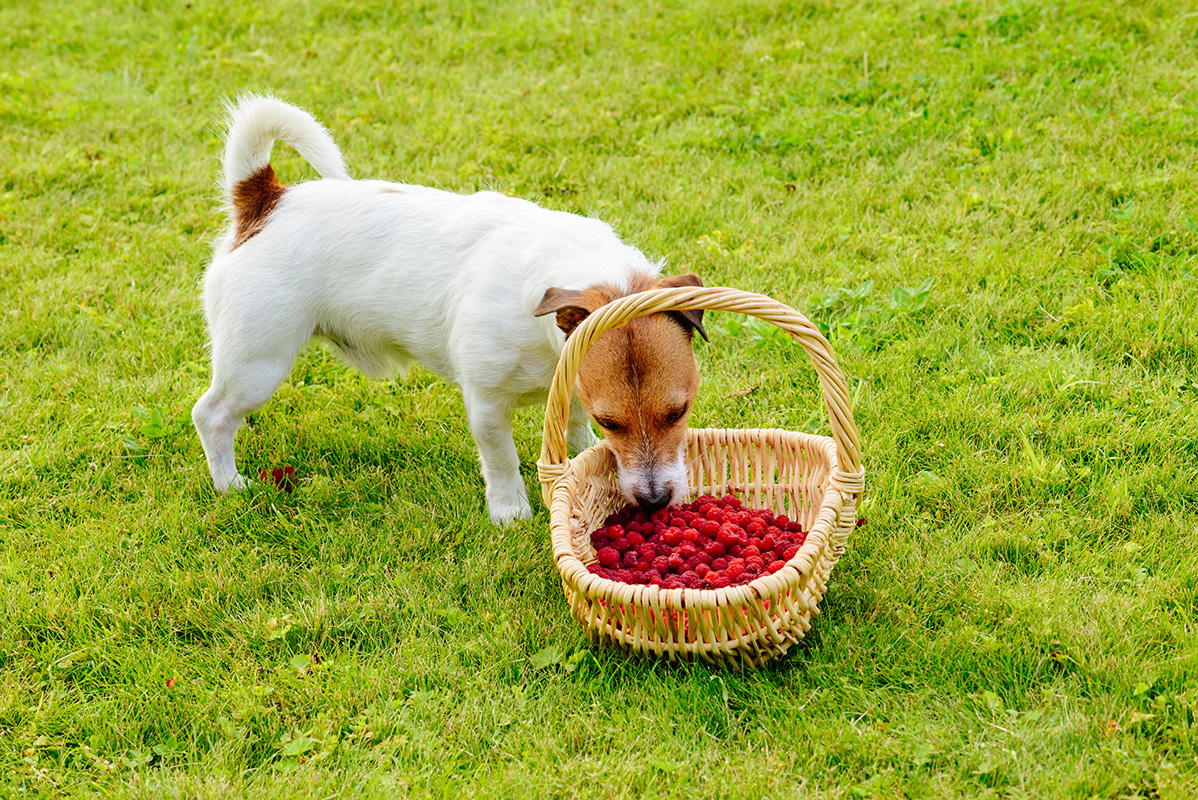
Red, juicy, and packed with nutrients, raspberries are a superfood that should be in everyone’s diet. But can dogs eat raspberries? Yes they can! But as with any treat, they should be fed in moderation.
But are raspberries good for dogs? It’s another yes! They play host to a clutch of beneficial nutrients like antioxidants and dietary fibre, whether consumed fresh or frozen. In this article, we’ll cover safety, health perks, and feeding volume.
So, can dogs have raspberries? Found out here…
Can dogs have Raspberries?
Can dogs have raspberries? Providing the dog has no allergies or intolerances, yes they can, but they must be in small quantities and in moderation.
When it comes to raspberries for dogs, they are stuffed with helpful nutrients like antioxidants and fibre and are low in calories, very much similar to when you consider blueberries for dogs.
However, they do contain the natural sweetener xylitol, which at high levels is very toxic to your furry friend. That begs the question, “Are dogs allowed raspberries?. They are, but too many can cause stomach issues and in smaller breeds, they may even pose a choking hazard.
We would only ever suggest that feeding raspberries should be in minimal quantities and as an occasional treat.
What about fresh versions, or can dogs eat frozen raspberries? Both forms are great for your dog, just be careful of the sugar content if your dog is diabetic and always defrost frozen berries to prevent any potential tooth damage.
So, if you’re wondering, “Are raspberries good for dogs?, then wonder no more…
Are Raspberries good for dogs?
Can dogs eat raspberries? Yes. But are raspberries good for dogs? It’s another yes!
Much like celery for dogs, vitamins and nutrients in raspberries are rich and robust, contributing to your canine’s overall health.
Vitamin B-complex is a group of 8 essential vitamins that keep your dog's energy levels high and support the immune system, blood cell production, digestive, skin and coat health, as well as helping reduce stress.
Magnesium helps all over! But it is key in regulating calcium and potassium levels.
Folic Acid aids DNA repair and proper development, especially in puppies.
Iron forms red blood cells which move oxygen around your canine’s body.
Vitamin C helps with inflammation and also fights off cell damage.
Potassium reinforces nerves, muscles and heart operation.
Manganese is vital for fat metabolism and joint health.
Vitamin K clots the blood and improves bone health.
Copper builds connective tissue and immunity.
Plus, antioxidants and dietary fibre reduce the risk of diseases and help fight obesity, making them great for pups right through to senior dogs. But always feed just one or two berries and only as an occasional treat for dogs without allergies or intolerances.
Should you include fresh berries, or can dogs eat frozen raspberries to access their goodness? Each type provides health-boosting benefits, so whichever suits you, but frozen berries must be defrosted first to avoid damaging the enamel of the dog’s teeth.
Much like peanuts for dogs, raspberries for dogs are clearly a fantastic way of adding powerful nutrients and vitamins to your dog’s diet. But when feeding a complete and balanced pet food suitable for your dog’s age and lifestyle, your pet will be getting all of the nutrients it needs in just the right amounts from its main meal.
So, can dogs eat raspberries? They can. But when are raspberries for dogs a bad thing?
When are raspberries bad for dogs?
Are dogs allowed raspberries every day and do they ever become bad for your canine’s health?
As always, raspberries should be fed in moderation as overfeeding can lead to digestive issues like constipation, diarrhoea, and vomiting. In smaller dogs, they can act as a choking hazard. Their sugar content makes them dangerous to dogs with diabetes.
And much like avocados for dogs, which contain a toxic element, the natural xylitol found in raspberries is harmful to your pet if consumed in large amounts. Too many could lead to hypoglycemia or liver issues.
Unripe raspberries may lead to upset tummies, whereas unwashed specimens may still have dirt, pesticides, or harmful bacteria on them. But can dogs eat frozen raspberries? They can, but make sure they’re suitably thawed to prevent any dental damage caused by your dog chewing on a rock-solid raspberry.
Be careful about raspberry products that aren’t just the berry, like yogurts or chocolates, as these may contain higher amounts of ingredients that are dangerous to your dog.
So, can dogs have raspberries? With all their health boosting qualities, they make a sweet and nutritious snack. Just remember to feed in moderation. Still want to know more about the necessary details for your dog’s diet?
Read our article that explores what dogs can and can’t eat.
How many raspberries can I give my dog?
So, can dogs eat raspberries? They can, but depending on the size of your canine, you’ll want to feed the right amount. Smaller breeds like Pugs or Pomeranians can take a couple at a time, whereas larger breeds like Great Danes or German Shepherds are safe to eat a handful.
Remember, though, raspberries are an occasional treat and only suitable for dogs without an allergy or intolerance to them, and much like barley for dogs or peanuts for dogs, they should only ever make up to 10% of your canine’s overall consumption.
To help watch if raspberries are suitable for your dog, monitor their digestion after eating them and introduce the berry in gradual steps.
Are raspberries poisonous to dogs?
But with the xylitol content, are dogs allowed raspberries - doesn’t that make them harmful? Not if fed in small amounts. Whilst xylitol is toxic, the amount in each raspberry is small, meaning they can only cause harm if fed in large numbers.
Be wary of buying raspberry-related products, like yogurts or jams, as they will likely contain excess sugar and other ingredients that are toxic to your canine.
Raspberries are a superfood and great for your dog’s overall health, but always remember not to feed your furry friend too many.
Why can't dogs eat raspberries?
Apart from their xylitol content, which is minimal, raspberries aren’t toxic to dogs, but you still may choose to avoid them for a few reasons. If your dog’s a smaller breed, they may pose a choking hazard, or your four-legged friend may be allergic.
Or, much like when considering bananas for dogs, which have a high sugar content, raspberries contain sweeteners too. Making them unsafe for dogs with diabetes.
Dogs with stomach sensitivities should avoid them as the excess fibre and sugar may cause digestive issues.









